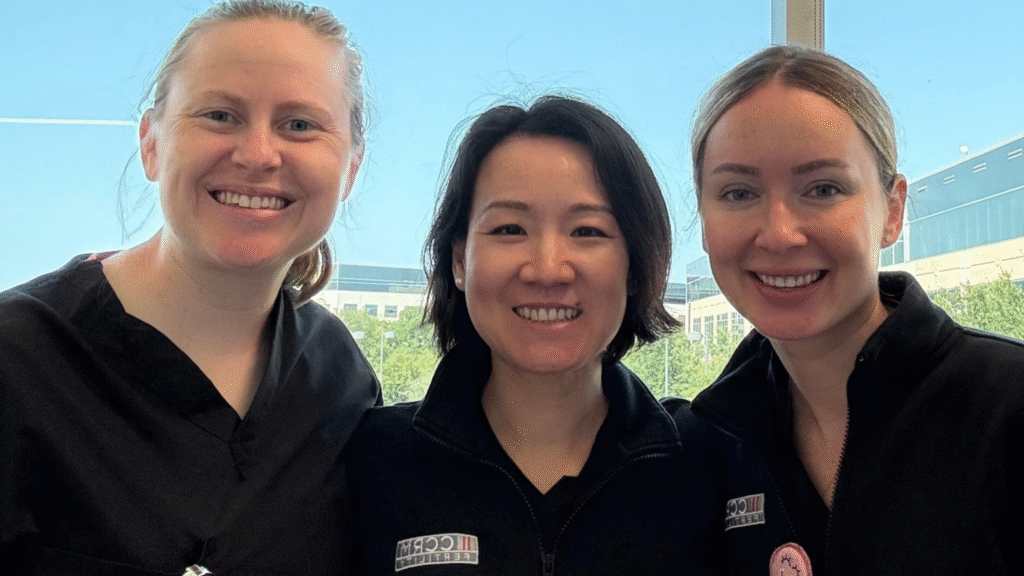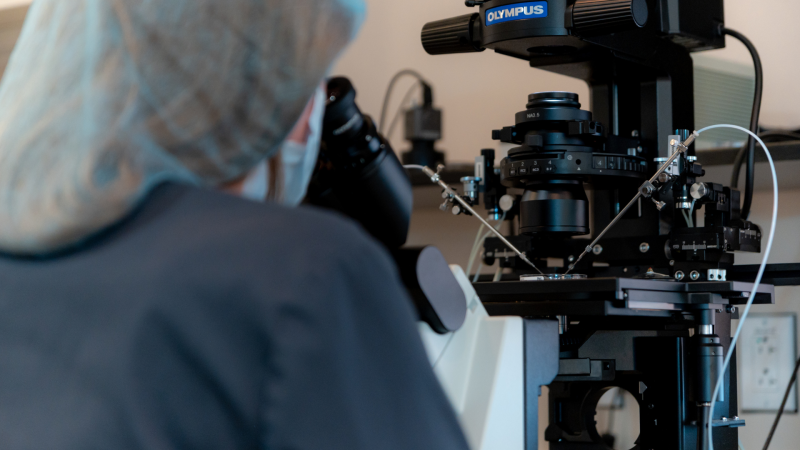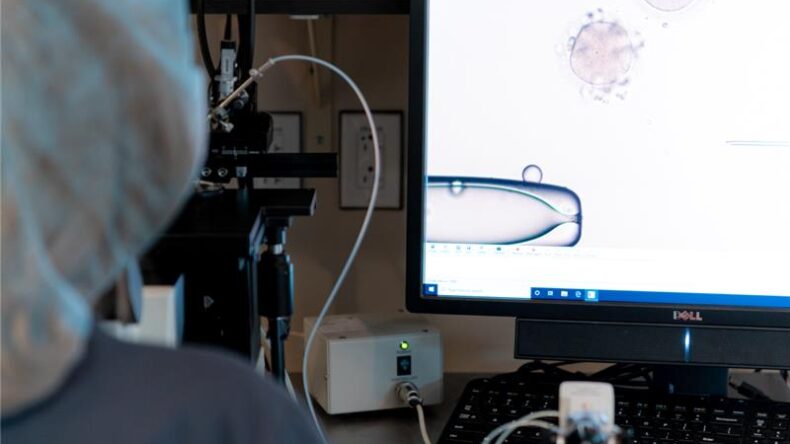
When completing an IVF cycle at CCRM Fertility, you’ll interact regularly with your provider, the front desk staff, phlebotomists, sonographers, and the rest of your supportive team. But behind the scenes are the embryologists, highly skilled and experienced scientists who nurture eggs, sperm, and embryos in our CCRM IVF lab, playing a vital role in turning hope into a healthy pregnancy.
They’re the ones checking for ooctyes (eggs) during an egg retrieval, fertilizing them with sperm, watching them grow into embryos (the earliest stage of development), and prepping your embryo for transfer. Much of our impressive success rates are due to the work these embryologists do in our state-of-the-art, award-winning CCRM labs.
In honor of World Embryology Day on July 25 (which is celebrated every year on the birthday of the world’s first-ever IVF baby, Louise Joy Brown), three CCRM embryology leaders shared insights into the embryologist’s role at each stage of an IVF cycle, the importance of quality control in a fertility lab (the embryologists even do their own janitorial work!), and what makes the CCRM IVF labs so special.
Featuring:
Bec Holmes, Senior Vice President, Lab Operations
Joe Conaghan, Director, Science and Training
Alex Lagunov, Director of Lab Technology
First things first: What is an embryologist and what do they do?
Joe Conaghan (JC): An embryologist is a scientist that works with gametes (sperm and oocytes) and embryos inside the IVF laboratory at a fertility clinic. We perform many IVF procedures within the lab, including egg retrieval, egg fertilization, embryo culture, biopsies, and embryo transfers.
Alex Lagunov (AL): We are the caretakers of your eggs and embryos. We ensure they are handled carefully and in an environment that fosters their best developmental potential. The majority of the procedures in the IVF laboratory require a hands-on manual approach by our skilled embryologists, along with the most advanced equipment. Embryologists are conscientious, diligent, obsessive, and detail-oriented. If you leave your house and leave a light on by mistake, you probably couldn’t be an embryologist.
Many patients may not realize how much embryologists do during the IVF process. Can you give us an overview?
JC: Yes. We have a hand during the egg retrieval, insemination, embryo culture, embryo biopsy for preimplantation genetic testing (PGT), and, finally, the embryo transfer. We go into more detail about the procedures an embryologist performs during IVF HERE.
What training did you complete to become an embryologist?
JC: We are scientists! Every embryologist has a minimum of a college degree in life sciences (Biology/Genetics/Chemistry) and hands-on embryology training in an IVF lab. There are no colleges or universities that train embryologists. It takes at least 2 years to become fully trained on all the procedures in the IVF laboratory. Once an embryologist has 4 years’ experience they can take certification exams and become a laboratory supervisor. All laboratory directors at CCRM have a PhD and are Board certified in their specialty.
Does each embryologist know how to perform all procedures?
AL: Yes, we are trained to do everything. The lab is staffed every day of the year and we rotate shifts. We each have our favorite procedures, though.
Bec Holmes: I like intracytoplasmic sperm injection (ICSI), as I get to see results in 18 hours!
AL: My favorite is embryo transfer because it’s the final most exciting, anticipated, and impactful step in the patient’s journey.
What else does your job entail?
JC: We perform many administrative and management functions. We physically make sure all equipment is working properly, keep the laboratory in compliance with state and federal agencies, train the next generation of embryologists, and manage and maintain frozen specimens. And since the IVF lab is off limits to other staff, we also do our own janitorial work. The IVF laboratory runs and is electronically monitored 24/7, 365 days a year. If the temperature in an incubator drops by 2 degrees at 3 am on a Sunday, an embryologist will be on site within minutes to address the issue.
Not even physicians are allowed in the IVF lab?!
JC: Only embryologists can enter the IVF lab. That’s because each CCRM lab is a “clean room” where the air is highly purified, and the environment is strictly controlled. If an outside person must enter the lab (e.g. building maintenance personnel), they wear protective clothing and are accompanied by an embryologist at all times.
What makes CCRM labs different?
AL: Over the past decade, the CCRM Fertility network has grown from a single location in Denver, Colorado to 20 full-service IVF laboratories throughout North America and counting. One of our key differentiators is consistency across design, equipment, supplies, safety, and operations.
We dedicate time and resources to internal embryologist training, cutting-edge research, and other tasks that help ensure the CCRM lab remains on the cutting edge to supply the best care possible.
What standards are CCRM IVF laboratories held to?
AL: Our laboratories are held to the highest standards in North America and accredited by the College of American Pathologists (CAP). This means our labs undergo yearly inspections and demands constant upkeep of lab protocols, procedures, and operations to achieve accreditation status. All our labs comply with the FDA, CDC, and all state-specific regulations. In addition to the external standards, the CCRM Fertility network of labs also have internal standards that are reviewed continuously.
How do you ensure all eggs, embryos, and sperm are safe?
AL: Our incubators and storage tanks are alarmed with independent systems. These alarm systems are monitored 24/7 by lab staff who are notified by email/text/call if conditions fall out of range. Generators and batteries ensure that all critical equipment and alarms are functional in case of power failure. Labs have back-up equipment and redundant systems in place in case any failures do arise. Safety protocols and staff training ensure that lab personnel know how to respond in case of any emergencies. Finally, CCRM utilizes electronic witnessing to ensure chain-of-custody and other cutting edge lab technology to continuously improve safety within the lab.
Can you explain the chain of custody?
BH: Ensuring every patient receives the correct sample is of course of utmost importance during treatment. We maintain this chain of custody using double witnessing and an electronic witnessing system called Matcher, which is an additional safeguard to help avoid mismatch errors. With Matcher, every culture dish and specimen tube that is used at any point in the IVF process is labeled with a unique bar code that links each item to the intended patient’s chart. All tracking information is stored in one secure location and easily accessible to the embryologists.
What’s the best thing about your job?
BH: There is nothing better than looking down a microscope and seeing a fertilized oocyte (zygote) or a beautiful embryo. We work every day with microscopic materials, but this work is translated into the BIGGEST reward of all: getting patients where they want to be on their fertility journey! We love seeing positive outcomes.
JC: We take immense pride in our work and delight in hearing patient success stories and seeing pictures of the babies we helped create.
Ready to learn more about our services and our state-of-the-art lab? Book your fertility consult at CCRM today.






